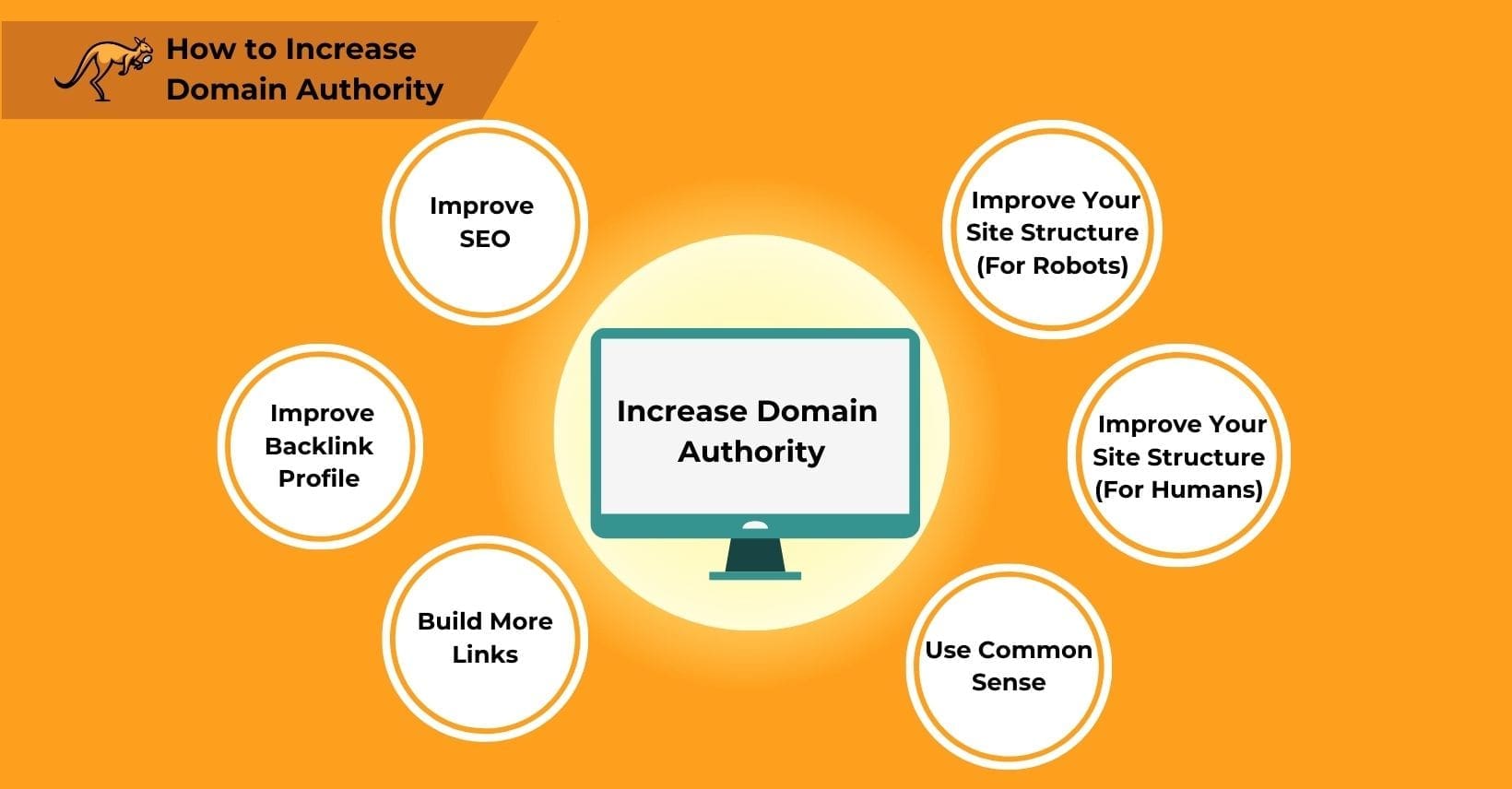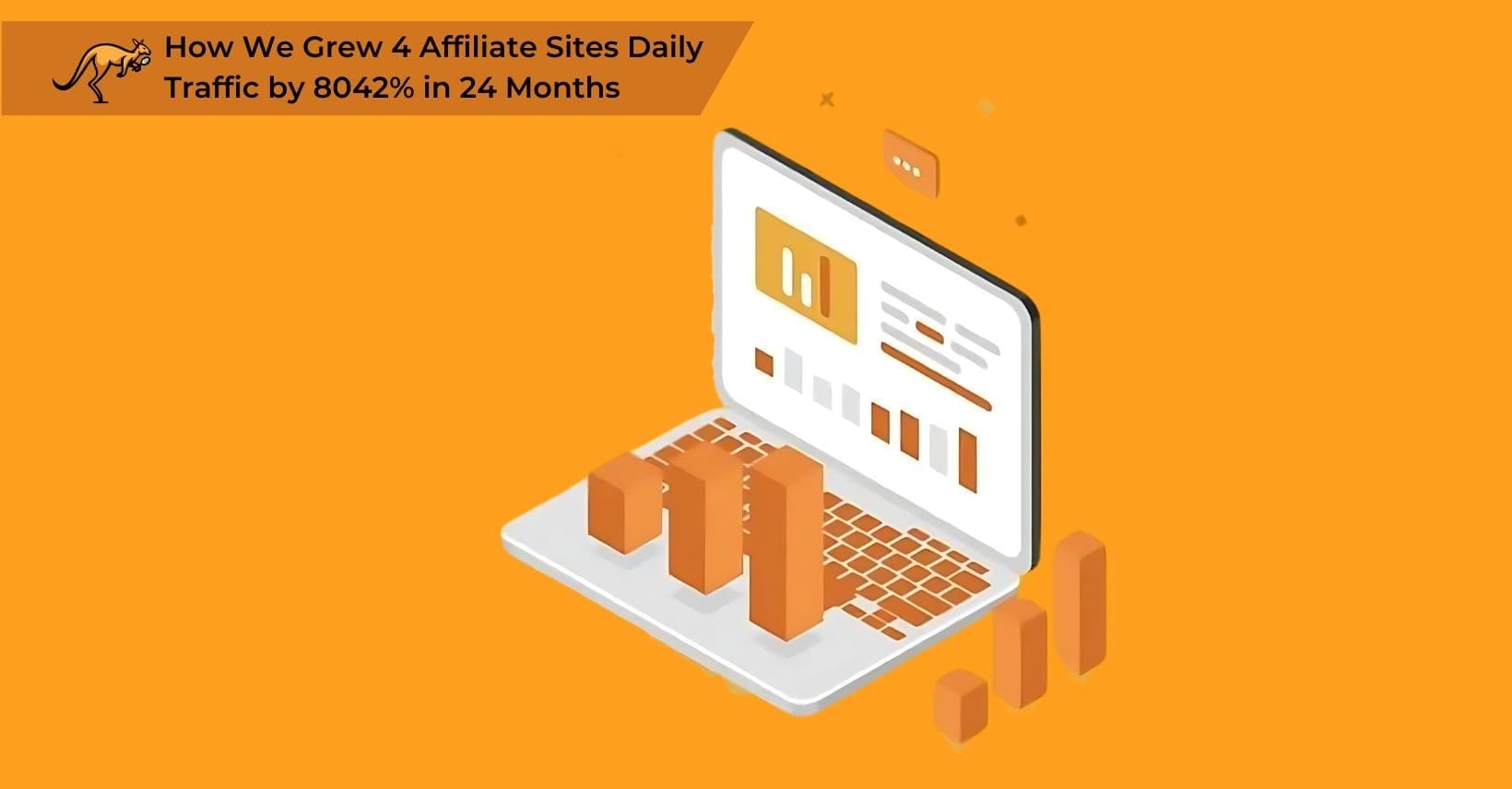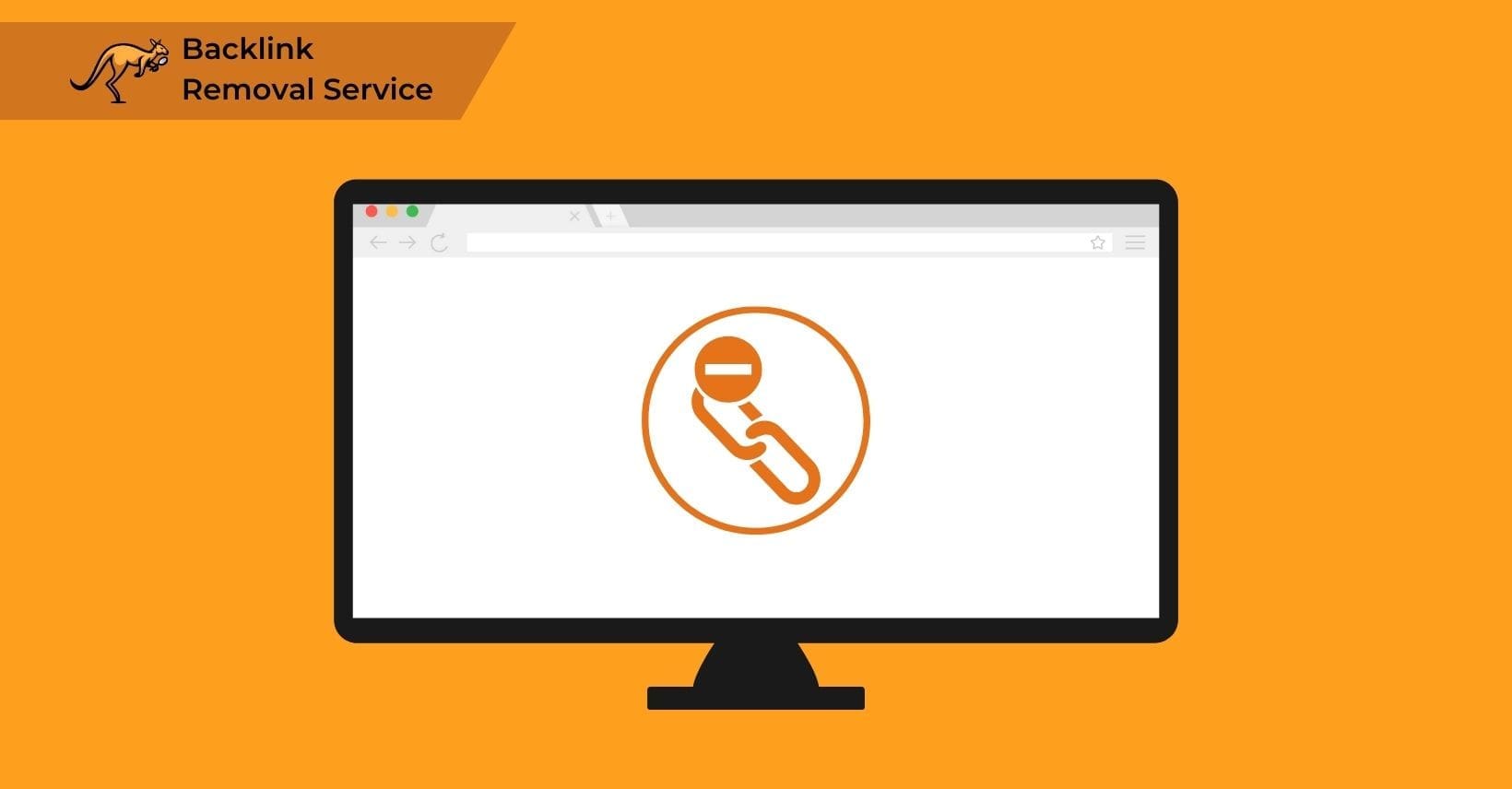Domain authority measures your website’s performance in search engine optimization (SEO).
Whether aiming for substantial SEO improvements or refining your current strategies, your domain authority score plays a key role in reaching your SEO targets.
It’s not a ranking factor for Google, yet it significantly influences SEO activities.
Comprehending what domain authority means and how it’s calculated helps you pursue optimal rankings in all scenarios and track your SEO progress over time.
So, what exactly is domain authority, and how does it function? What does it reveal about SEO, and how should you use this data to boost your search rankings?
As we explore these questions, we’ll also look into the Domain Authority Score, highlighting its importance and measurement.
What is Domain Authority Score?
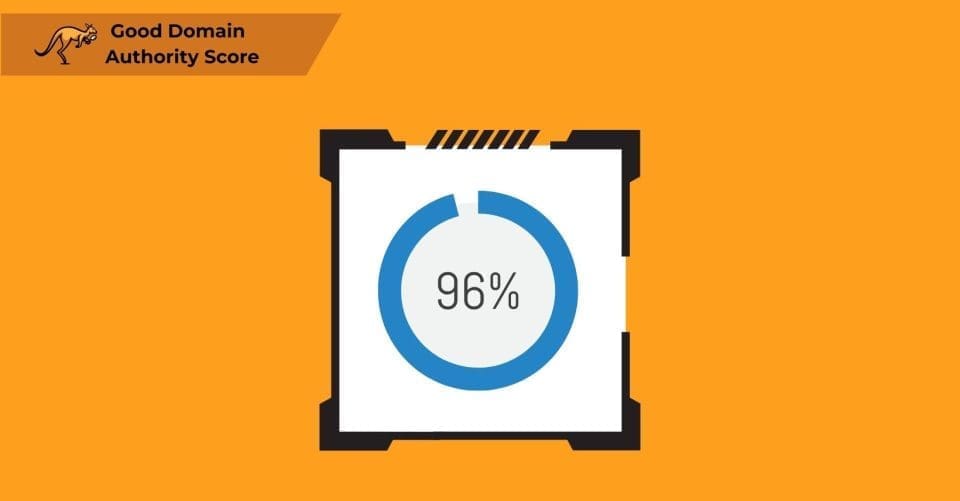
Domain Authority (DA) is a score developed by Moz that predicts how well your website will rank on search engines, which serves as a vital metric for measuring your site’s overall SEO strength and credibility that directly impacts your visibility in search results and competitive positioning within your industry.
It’s a scale from 1 to 100, where higher scores suggest your site is more likely to achieve good search engine rankings.
Your site’s authority is determined by various factors that mark it as trustworthy and high-ranking.
Unlike metrics targeting particular terms or niches, domain authority assesses the overall quality of your site, making it a key indicator of your site’s SEO health.
High DA scores imply that your site is well-optimized and of high quality, boosting its chances of ranking above others in search results.
Essentially, a high domain authority signals strong SEO potential, allowing your site to outperform competitors for the same search terms.
However, understanding domain authority involves more than recognizing its importance in SEO rankings; it prompts us to ask what factors contribute to shaping this crucial score.
What Influences Domain Authority Score?
A website’s Domain Authority (DA) score is influenced mainly by its backlink profile, which includes the links and domains that direct traffic to your site.
This aspect is crucial for search engine optimization (SEO), as a strong backlink profile generally leads to better search engine responses.
Therefore, the DA score, reflecting factors such as SEO performance and content quality, is a reliable indicator of a site’s potential success on search platforms.
Additionally, since DA incorporates various SEO-related metrics, it summarizes a website’s SEO health concisely.
Exploring the importance of domain authority reveals why it plays a key role in determining a site’s visibility and reach.
Why is a Website’s Domain Authority Important?
Google does not factor Domain Authority (DA) into its ranking algorithm.
Yet, DA remains a key indicator of your website’s performance. This metric is grounded on distinct factors reflecting your site’s quality and effectiveness, serving as a comparative tool.
Although a high DA doesn’t guarantee top rankings or increased traffic directly, it offers a glimpse into your site’s SEO capabilities, utilized or not, as websites with higher domain authority scores typically experience better SEO performance because the factors Moz uses to calculate domain authority correlate strongly with factors that influence search engine rankings.
Viewing your domain authority as a forecast can inform your SEO planning, pinpointing critical improvement areas.
Employing a domain authority checker allows for comparison with rivals, aiming to surpass their scores for better search result placements.
Venturing into strategies for boosting your domain authority could set the stage for stronger competitive standing, paving the way to assess and enhance your site’s SEO health.
Checking Domain Authority Scores
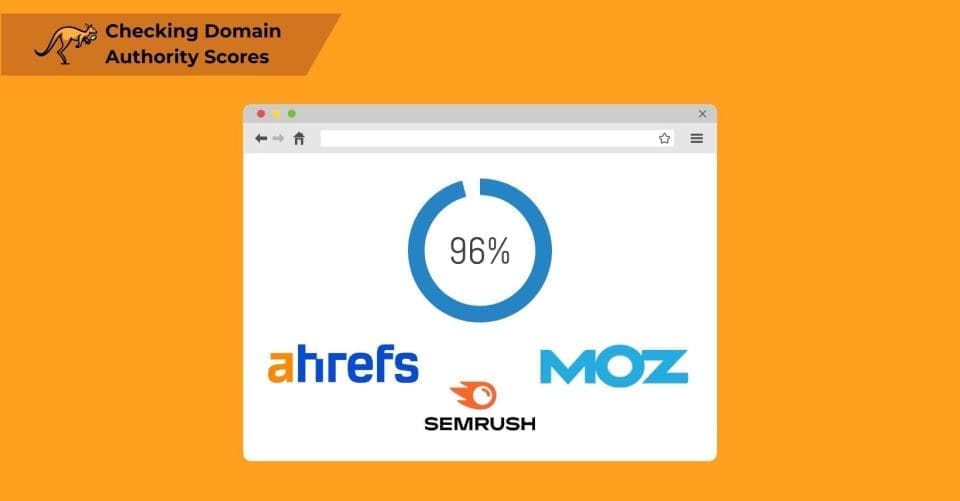
Regularly checking your domain’s authority requires specific measurement tools that provide accurate scoring metrics. The MOZ Domain Authority (DA) system rates your domain’s search ranking potential through their free domain analysis tool, while SEMrush and Ahrefs offer alternative domain authority measurement systems through their comprehensive SEO platforms that track your progress over time and compare your scores against competitors.
Understanding your performance stats can significantly influence your SEO strategies.
Considering tools that provide such insights, we’ll also look into what SEMrush and Ahrefs offer in this context.
Moz
As the original creators of the domain authority score, the MOZ Domain Authority (DA) tools allow you to quickly check any website’s domain authority with just a URL.
This gives you an incredibly easy way to understand how much domain authority different sites have, allowing for very easy comparisons.
Not only do these tools provide domain authority score information, but they can also offer reports such as the top links that influenced domain authority or the anchor text and metadata that was relevant to the end result.
This – combined with a backlink checking tool – can make for a powerful combination when trying to root out bad links from your site or identify high-quality backlinks sources that you can copy from competitors.
SEMrush
SEMrush is a very popular tool for all kinds of SEO work, and it can also be used to break down domain authority.
The Backlinks Analysis section lets you see the domain authority scores of a site, as well as the sites that some of the links are coming from.
This can give you a solid understanding of why your domain authority score is at the level it is at.
Beyond domain authority, SEMrush is also a good general-purpose SEO tool, making it important for a range of other tasks.
Ahrefs
Ahrefs offers a popular tool that rates websites with a Domain Rating score.
Different SEO platforms measure domain authority using distinct proprietary algorithms that evaluate your website’s strength differently: Moz calculates Domain Authority (DA) focusing heavily on link quality and quantity, Ahrefs uses Domain Rating (DR) emphasizing the strength of your backlink profile, while SEMrush employs Authority Score incorporating traffic data and brand signals alongside link metrics.
Despite these differences, comparing the scores from both Ahrefs and Moz can be insightful. It helps in identifying discrepancies one might miss, highlighting areas for improvement.
This cross-referencing approach can pave the way for strategies to enhance a website’s Domain Authority.
Increasing Domain Authority
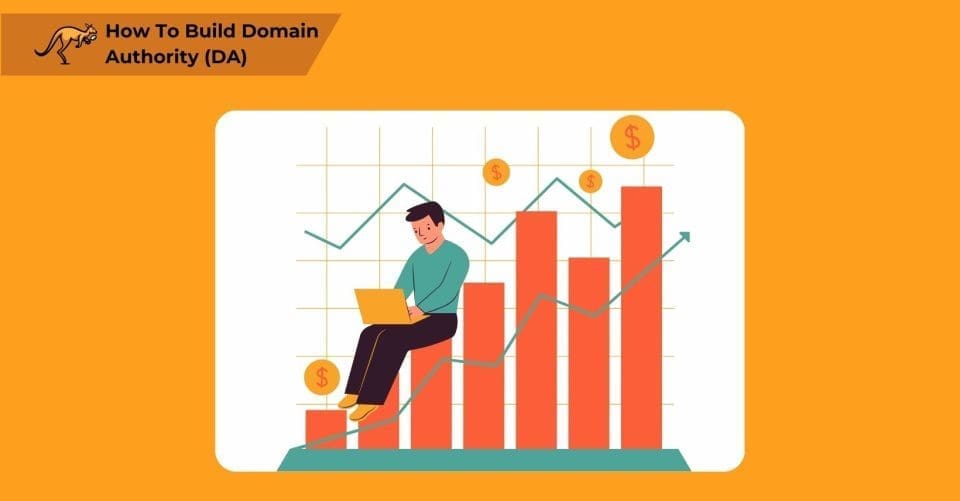
Boosting your website’s domain authority requires implementing a comprehensive strategy that combines quality content creation, technical SEO optimization, and strategic link building practices, which collectively strengthen your site’s credibility with search engines and gradually enhance your domain authority score.
This methodical approach aims to rank your website higher in search results through consistent application of proven techniques.
Be cautious, though, as incorrect methods, especially those considered black-hat, can harm your SEO efforts over time.
The key to increasing your domain authority score, directly or indirectly, involves adopting ethical and careful strategies. But what steps can you take to achieve this?
Domain authority increases gradually rather than instantly, with most websites requiring a dedicated 3-6 month period of consistent SEO implementation before seeing measurable improvements in their scores, which depends on the quality of your link building strategy, content creation efforts, and the competitive landscape of your industry.
Learning these methods, we’ll also touch on ways to improve your SEO strategies further.
1) Improve Your SEO
The effectiveness of your website hinges largely on SEO performance, which closely ties to the domain authority (DA) score.
These metrics share common factors, indicating that strategies enhancing SEO simultaneously improve DA.
A stronger SEO presence translates into better visibility on search platforms.
Since DA mirrors SEO’s foundational principles, elevating your site’s DA often results in enhanced SEO impact.
By refining SEO strategies, you boost your site’s visibility and increase traffic, profits, and user engagement.
This cascading effect of success introduces the potential for further growth through strategic link-building and partnerships beyond your site.
Off-Page SEO
Off-page SEO primarily involves link building alongside tactics such as creating social media profiles to direct more traffic to your primary website.
Effective methods like content marketing, guest blogging, social media engagement, and collaborating with influencers help boost a website’s domain authority without altering its internal setup.
These approaches require skill and are often combined with traditional SEO methods for enhanced effectiveness.
Link building remains central to off-page SEO due to its substantial influence on search rankings and authority. While these off-page strategies are effective, they excel when integrated with additional SEO tools.
Considering how these external efforts complement internal optimizations, it’s helpful to turn our attention to the role of on-page SEO in refining website content and structure for better search engine visibility.
On-Page SEO
On-page SEO focuses on boosting your site’s ranking by making changes directly on it.
This includes speeding up how fast pages load and updating metadata and tags to match the content of each page accurately.
Search engines don’t just look at what’s visible, like text and pictures. They also examine hidden details, such as metadata, how pages link, and how quickly the site loads.
For instance, a site that loads slowly or has images without the correct tags might not rank as well. Improving your site with on-page SEO is key to outperforming competitors online.
Moving smoothly from on-site optimizations, another key area to consider involves the technical backbone of your website, which plays an important role in its visibility online.
Technical SEO
Technical SEO differs from on-page SEO primarily because it emphasizes code aspects of a website.
This focus includes improving site speed and optimizing the site’s structure to perform better overall.
For instance, too much code can slow down a website. Not having a mobile-friendly design can prevent mobile users from accessing the site effectively.
These factors are key for enhancing your website’s visibility on search engines.
However, they don’t change how your site looks in search results; they help it appear more frequently.
Considering how various SEO tactics contribute to visibility, it’s also useful to examine how effectively keywords are researched and selected to target the right audience.
Keyword Research
Keyword research identifies the search terms your audience uses. Since all searches are conducted through keywords, these terms are crucial for your site’s visibility on Google and other platforms.
A site becomes more visible when it includes relevant search terms prominent in its backlink profile.
By understanding the preferred keywords of your audience, you can strategically place these words in your site’s content and links to enhance visibility.
This strategy keeps your site competitive and prepares you for potential expansion in marketing strategies.
As you strengthen your site’s content with these targeted keywords, enhancing your backlink profile also becomes integral to boosting your online presence.
2) Improve Your Backlink Profile
Securing links from reputable websites with high authority can naturally enhance your backlink profile, leading to higher domain authority.
Backlinks, especially from sites with significant relevant and trustworthy authority, are the main determinant in domain authority calculation.
Websites lacking in backlinks usually experience minimal traffic until they develop a robust link profile.
Good backlinks consist of three core things:
- They come from high-authority sites that are reliable and trustworthy.
- They are relevant to the target site, and both the target and source pages are relevant to one another.
- They are not created through black-hat methods or spam sites and will not collapse the next time a Google spider crawls that site.
The aim is to gather backlinks from sources of substantial relevance and trustworthiness to your content.
Quality backlinks are paramount, so searching for inbound link sources with genuine authority is needed.
This could involve examining competitors’ backlinks, securing links from previous collaborators, or establishing social media profiles that link back to your site.
The goal is to enrich your link profile, making it more valuable over time, thereby elevating your website’s authority metrics.
As your site amasses more high-quality links, its authority metrics will ascend.
With the foundation of a strong backlink profile in place, it becomes pertinent to ensure these links maintain their integrity and continue to support your site’s credibility.
This naturally leads to the importance of auditing your existing links. This process ensures your backlinks remain robust and beneficial.
Audit Your Existing Links
Creating high-quality links is crucial, but performing a link audit and removing any harmful links that might negatively affect your website is equally vital.
These low-quality links, often from spammy sites, can damage your domain authority and even result in penalties from Google and other search engines.
Identifying such toxic links requires tools like Google Search Console, which helps pinpoint detrimental connections by revealing backlinks with suspicious patterns, irrelevant content, or from known spam domains that should be disavowed through Google’s disavow tool to prevent negative impacts on your domain authority.
Removing harmful links is essential to maintaining a clean link profile.
To eliminate links that detract from your site’s authority, you can use the disavow tool in Google Search Console or similar tools on other platforms.
Focusing on refining the link strategy leads to the identification of specific niches that can enhance SEO efforts.
Identify Your SEO Niches
High-quality backlinks depend on the connection between root domains and linking sites and the relevance of linked content.
Understanding your niche and relevant topics is crucial for acquiring links.
For instance, a furniture brand aligns well with other furniture sites or content about buying furniture. It may also connect with interior design blogs.
However, it might not relate to a blog post about painting walls. This relevance is essential for identifying poor links in your backlink profile.
Conducting a link audit can reveal seemingly beneficial links that are irrelevant and potentially harmful to your brand. Moz prioritizes relevance when calculating domain authority; therefore, a site continually receiving irrelevant links might see a drop in its DA score.
This understanding of relevance underscores the importance of actively building more connections across relevant sites.
3) Build More Links
Link building is essential to increase your website’s domain authority. Adopting a strong link-building strategy can secure various links from respected sites, significantly boosting your domain’s authority.
Effective link building enhances your SEO by connecting with high-authority sites. It underscores the importance of consistently acquiring high-quality links.
Search engines like Google use links as a primary ranking factor, and a well-rounded link portfolio not only supports SEO but also attracts more visitors.
To obtain these links, you can employ a range of strategies, from safe, white-hat methods approved by Google to riskier black-hat methods.
Adhering to Google’s guidelines is the safest approach to collect valuable links, improving your site’s domain and SEO health without unnecessary risks.
These strategies’ specifics will reveal practical steps for fortifying your site’s link structure, paving the way for enhanced visibility and success.
Start Building Links

Even with moderately strong links, accumulating more relevant inbound connections can improve your search engine optimization (SEO) and domain authority (DA).
Building links is a key method for enhancing domain authority. Employing various strategies can lead to a good authority score, primarily through quality links supporting your site.
Off-page SEO, which involves acquiring new links regularly, comes in many forms and is crucial for your site’s performance.
Occasionally, adding average yet relevant links to your backlink profile can be beneficial.
There’s no need to restrict yourself to high-quality links; even basic links from relevant sources can boost your SEO.
This approach sets a solid foundation for creating exceptional content that naturally attracts links.
Create Great Content to Gain Natural Links
Content creation plays a fundamental role in increasing domain authority by attracting natural backlinks from other websites that recognize your content’s value, which signals to search engines that your website serves as an authoritative resource within your niche and deserves higher ranking positions.
When you offer articles or posts people find useful, they are more inclined to reference your site, boosting traffic and domain authority incrementally.
Good content fosters this link generation and brings other advantages like increased organic traffic and new avenues for on-page SEO improvement.
Furthermore, by regularly providing in-depth content, your website may become recognized as a credible authority within your niche.
This reputation can lead to additional trust-based links from readers who view your site as a reliable information source.
Exploring the benefits of rebuilding broken links can further enhance connectivity and site reliability.
Rebuild Broken Links
Producing compelling content enhances your domain authority by encouraging the natural accrual of links.
When you offer useful articles or posts, people are more inclined to reference your site, boosting traffic and domain authority incrementally.
Good content fosters this link generation and brings other advantages like increased organic traffic and new avenues for on-page SEO improvement.
Furthermore, by regularly providing in-depth content, your website may become recognized as a credible authority within your niche.
This reputation can lead to additional trust-based links from readers who view your site as a reliable information source.
Exploring the benefits of rebuilding broken links can further enhance connectivity and site reliability.
Reclaim Lost Links
When your links break or are removed by another website, restoring them is crucial.
Suppose a link breaks accidentally; contacting the website’s webmaster can usually resolve the issue.
However, suppose your link was purposely removed or swapped for a competitor’s link.
In that case, you may need to engage in more detailed discussions to address the issue.
This active monitoring and recovery of online mentions is a stepping stone to spotting and securing brand mentions that aren’t directly linked to your site.
Capture Unlinked Brand Mentions
When your brand is mentioned online, it’s a good opportunity to request link placements.
If an article already mentions your brand, simply reach out and propose adding a link to your site.
However, use discretion based on the content’s tone; for instance, a piece critical of your company is unlikely to agree to include your link.
Secure a link might involve negotiation, particularly if the primary goal is enhancing your search engine optimization.
Preparing your site’s structure to be more accessible for search robots can further optimize these efforts, making it easier for them to index and understand your pages.
4) Improve Your Site Structure (For Robots)
The structure of your website affects its authority in search engine rankings, though it might not be immediately clear why.
Search engine bots, or crawlers, rely on this structure to navigate your site effectively.
As they assess your website, these crawlers might accidentally access incomplete or technical pages not intended for public view or even flag duplicate content from pages like internal search results that don’t impact your SEO efforts.
By implementing a sitemap and a robots.txt file, you can guide these bots toward the pages you want to highlight and keep them away from irrelevant ones to your ranking.
Such careful planning not only optimizes your site for search engines but also makes it more user-friendly, setting a solid foundation for visitors to easily find what they need.
This approach naturally improves your site structure for human users, enhancing their overall experience.
5) Improve Your Site Structure (For Humans)
While crawlers play a crucial role, remember that human visitors are equally important when designing your site.
A poorly organized website can lead visitors to unwanted content, increasing their likelihood of leaving.
Such occurrences hurt your search engine optimization (SEO) and may also reduce your domain authority (DA) in some cases. Effectively structured internal links guide visitors through your site, enhancing their experience and potentially improving your SEO.
These links should connect to relevant pages, reflecting the context and text used in the links, similar to external links.
Although this strategy might not immediately increase organic traffic, it simplifies site navigation and indirectly boosts your rankings.
Employing common sense in web design retains human interest and sets the stage for more intuitive user interactions.
6) Use Common Sense
Your website’s domain authority reflects its quality and reliability, with scores ranging from 1 to 100.
A high score makes your site more likely to rank well in search results.
For instance, a domain authority of 20 suggests significant potential for improvement, while a score of 80 indicates you’re nearing perfection.
Use this metric as a marker to gauge further enhancement possibilities. Consider strategies like link building if your evaluation reveals a deficit in quality links.
Conversely, a persistently low score may require removing poor links or implementing technical SEO improvements to enhance user experience.
With these strategies, it’s worth pondering whether engaging an SEO agency could elevate your domain rating.
Is It Worth It to Invest in an SEO Agency to Boost Domain Rating?
Choosing the right SEO agency to boost your domain rating is a crucial decision that impacts your site’s visibility and organic traffic.
SEO agencies excel in refining your website through content strategy, keyword optimization, technical SEO, and backlinking—key components for enhancing domain authority.
It’s essential to evaluate an agency’s knowledge and experience and verify that they provide strategies that meet your needs while considering the potential return on investment.
A higher domain authority usually results in more traffic and better conversion rates, which can offset the cost of SEO services.
Your choice should consider your budget, the industry’s competitive nature, and overall business objectives.
As we explore how to effectively increase domain authority, you might wonder how Searcharoo specifically can make a difference in this area.
Creating a systematic plan to increase domain authority requires setting measurable goals, conducting a thorough audit of your current SEO status, identifying improvement opportunities in your content and backlink profile, implementing changes methodically, and tracking progress through regular domain authority checks while adjusting your strategy based on performance data.
Why Searcharoo Stands Out as SEO Agency in Improving Domain Authority
Selecting an effective SEO partner is vital, and Searcharoo excels with distinct benefits.
We develop customized strategies that tackle your business’s specific challenges and objectives.
Known for our dedication to transparency, we provide detailed reports that track the actions implemented and measure their effects on website performance.
With a history of content clients and successful projects, Searcharoo has proven its ability to boost domain authority and improve digital visibility.
Our focus is sustainable SEO techniques that ensure long-lasting improvements through ethical methods, making Searcharoo a reliable partner for maintaining high domain authority.
As we consider the importance of domain authority, it’s also useful to understand another key metric influencing website credibility and search rankings: page authority.
What is Page Authority?
Domain authority scores measure an entire website’s reputation and ranking potential across all its pages, while page authority scores specifically evaluate individual pages’ strength and likelihood to rank well in search results, with both metrics using different calculation factors despite sharing the same 1-100 scale developed by Moz.
Moz developed both concepts, which are integral to SEO strategies. Domain authority measures a site’s overall strength in search rankings. In contrast, page authority assesses the influence of a single page using a logarithmic scale from 1 to 100, which makes it tougher to boost than domain authority.
Unlike domain authority, page authority relies heavily on backlinks and overlooks other SEO tactics like keyword optimization.
A page with low page authority on a high domain authority site may lack effective backlinks, which highlights underperforming pages and helps identify those with strong backlink profiles.
Understanding these nuances also allows for exploring other relevant factors in domain authority scores.
Other Things to Know About Domain Authority Scores
Domain authority affects every web page and serves as a metric reflecting a website’s effectiveness on search results, even though it can sometimes be perplexing.
Unlike standard SEO measures, site authority symbolizes how well a site performs online rather than providing a direct measure of its quality.
For those new to SEO and domain authority, it’s important to grasp a few key concepts that might impact your understanding and application of these scores.
Considering how interconnected various aspects of SEO are, including the role of internal links, we might wonder: do these connections within a site also influence its perceived authority?
Do Internal Links Matter?
Internal links affect domain authority by distributing page authority throughout your website’s structure, which creates a network of connected content that search engines can crawl more efficiently and understand more thoroughly, ultimately strengthening your overall site authority while simultaneously improving user navigation and reducing bounce rates.
While these links don’t directly alter search rankings, they aid SEO spiders in indexing a site more effectively.
A well-organized website structure benefits SEO and enhances the user experience, potentially increasing customer retention. This setup prevents visitors from immediately departing, positively affecting a site’s SEO standing.
Effective internal linking ensures easier navigation for all visitors through organic search or paid advertisements. Considering the impact of internal linking on a website’s performance, exploring how
Domain Authority functions across various search engines is intriguing, shedding light on the broader implications for SEO strategies.
How Does Domain Authority Work on Other Search Engines?
A domain authority score is independent of any platform like Google. It does not align closely with any specific search algorithm.
It clearly indicates a website’s potential SEO performance, suggesting its ability to rank well across various search engines.
These search engines often share similar algorithms; therefore, a high rank on Google likely translates to strong performance on other platforms.
However, outcomes can vary by search engine, so analyzing data from different search sources is important.
With this in mind, one might wonder how such a score is derived—what factors and calculations are involved in assessing a website’s domain authority?
How Exactly is Domain Authority Calculated?
Domain authority is calculated using several key factors, including the number of root or referring domains, the total number of links a site has, and the quality of those links, with Moz employing a machine learning algorithm that weighs these factors differently based on their correlation with high search engine rankings.
These elements contribute to domain authority and enhance a site’s visibility in search engine results.
The process used for these calculations is distinct from methods used by Google or other search platforms, indicating that they may differ in their evaluation criteria.
Knowing these factors can guide us toward what makes a website particularly appealing to link to.
What is a Link Worthy Site?
Link-worthy web pages often feature informative content, are fast to load, and have strong backlinks relevant to user searches. The value and optimization of content are key: higher-quality content generally attracts more links.
Conversely, sites filled with low-quality content may attract links, but these tend to be less valuable. When other sites link to yours, they do so because they see your content as a reference or a valuable resource.
Improved content directly correlates with better-linking results. On content value, one might wonder about the importance of metrics like Domain Authority in evaluating a site’s potential impact.
Is Domain Authority Really That Important?
Domain authority is a key indicator of a website’s success and ability to rank well potentially.
Alone, it provides a basic snapshot of ranking potential. Still, when integrated with other metrics, it enhances your SEO efforts significantly.
This metric reveals if a website is reaching its expected potential or still faces unresolved issues.
Although domain authority doesn’t pinpoint specific problems, it offers a quick gauge of a site’s performance relative to its competitors.
As we look ahead, exploring how to optimize domain authority will shed more light on maximizing website effectiveness.
Conclusion
Domain authority is a simple concept that can relate to a lot of different tasks.
While this article has broken down domain authority well, you usually still need some practical experience to understand it.
Using domain authority as a measuring stick is not hard, but it can take some time to fully adjust to.
It is important to remember that domain authority is not an SEO measurement but a general guideline.
Using domain authority as intended – to quickly compare sites and see how you are performing – can make a huge impact on your SEO efficiency and efforts.
Just remember that domain authority is not the only metric you have to work with. Domain authority should always be used alongside other forms of hard data and measurement to get the best results.
